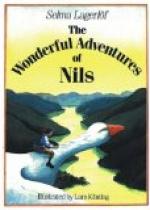The nearer she approached the place the happier she felt. It was autumn, which meant a busy time with a round of duties. It must have been all these varying duties which prevented home from ever being monotonous. All along the way the farmers were digging potatoes, and probably they would be doing likewise at her home. That meant that they must begin immediately to grate potatoes and make potato flour. The autumn had been a mild one; she wondered if everything in the garden had already been stored. The cabbages were still out, but perhaps the hops had been picked, and all the apples.
It would be well if they were not having house cleaning at home. Autumn fair time was drawing nigh, everywhere the cleaning and scouring had to be done before the fair opened. That was regarded as a great event—more especially by the servants. It was a pleasure to go into the kitchen on Market Eve and see the newly scoured floor strewn with juniper twigs, the whitewashed walls and the shining copper utensils which were suspended from the ceiling.
Even after the fair festivities were over there would not be much of a breathing spell, for then came the work on the flax. During dog days the flax had been spread out on a meadow to mould. Now it was laid in the old bath house, where the stove was lighted to dry it out. When it was dry enough to handle all the women in the neighbourhood were called together. They sat outside the bath house and picked the flax to pieces. Then they beat it with swingles, to separate the fine white fibres from the dry stems. As they worked, the women grew gray with dust; their hair and clothing were covered with flax seed, but they did not seem to mind it. All day the swingles pounded, and the chatter went on, so that when one went near the old bath house it sounded as if a blustering storm had broken loose there.
After the work with the flax, came the big hard-tack baking, the sheep shearing, and the servants’ moving time. In November there were busy slaughter days, with salting of meats, sausage making, baking of blood pudding, and candle steeping. The seamstress who used to make up their homespun dresses had to come at this time, of course, and those were always two pleasant weeks—when the women folk sat together and busied themselves with sewing. The cobbler, who made shoes for the entire household, sat working at the same time in the men-servants’ quarters, and one never tired of watching him as he cut the leather and soled and heeled the shoes and put eyelets in the shoestring holes.
But the greatest rush came around Christmas time. Lucia Day—when the housemaid went about dressed in white, with candles in her hair, and served coffee to everybody at five in the morning—came as a sort of reminder that for the next two weeks they could not count on much sleep. For now they must brew the Christmas ale, steep the Christmas fish in lye, and do their Christmas baking and Christmas scouring.




